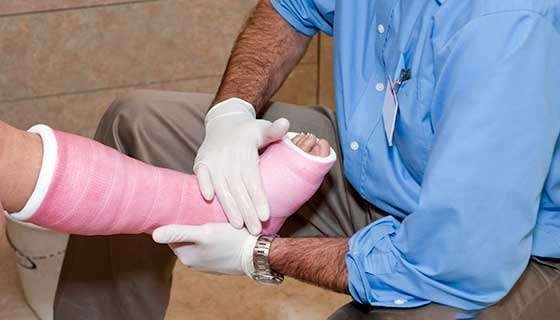A nurse is caring for a school-age child following the application of a cast to a fractured right tibia.
Which of the following actions should the nurse take first?
Elevate the child's leg.
Administer pain medication.
Petal the edges of the cast.
Teach the child about cast care.
The Correct Answer is A
The first action the nurse should take is to elevate the child’s leg.

This is choice A. Elevating the child’s leg can help reduce swelling and improve circulation.
After elevating the child’s leg, the nurse can then administer pain medication (choice B), petal the edges of the cast (choice C), and teach the child about cast care (choice D).
Nursing Test Bank
Naxlex Comprehensive Predictor Exams
Related Questions
Correct Answer is D
Explanation
Cleanse the gums with saline-soaked gauze.
This can help keep the mouth moist and clean, which is important for preventing infection and promoting healing of oral ulcers caused by chemotherapy.

Choice A is wrong because routine oral care should be performed more frequently than every 8 hours.
Choice B is wrong because lemon glycerin swabs can dry out and irritate the mucosa.
Choice C is wrong because oral viscous lidocaine should not be used in children due to the risk of toxicity.
Correct Answer is C
Explanation
A potassium level of.2 mEq/L is considered low.
Low potassium levels can cause muscle weakness and spasms.
Hyporeflexia refers to below normal or absent reflexes and can be a sign of muscle weakness.
Choice A is wrong because oliguria, or decreased urine output, is not a common symptom of low potassium levels.
Choice B is wrong because hypertension, or high blood pressure, is not a common symptom of low potassium levels.
Choice D is wrong because hyperactive bowel sounds are not a common symptom of low potassium levels.
Whether you are a student looking to ace your exams or a practicing nurse seeking to enhance your expertise , our nursing education contents will empower you with the confidence and competence to make a difference in the lives of patients and become a respected leader in the healthcare field.
Visit Naxlex, invest in your future and unlock endless possibilities with our unparalleled nursing education contents today
Report Wrong Answer on the Current Question
Do you disagree with the answer? If yes, what is your expected answer? Explain.
Kindly be descriptive with the issue you are facing.
